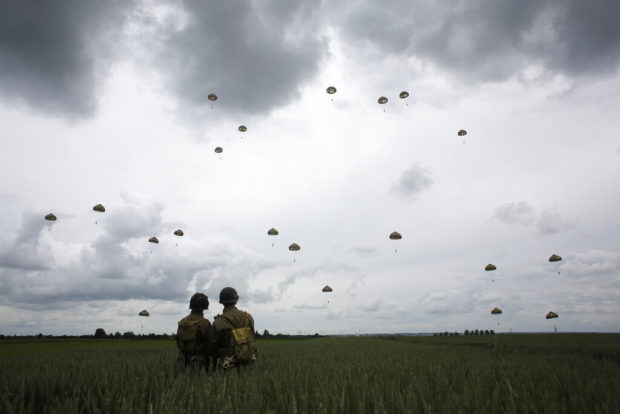
WWII enthusiasts watch French and British parachutists jumping during a commemorative parachute jump over Sannerville, Normandy, Wednesday, June 5, 2019. Extensive commemorations are being held in the U.K. and France to honor the nearly 160,000 troops from Britain, the United States, Canada and other nations who landed in Normandy on June 6, 1944 in history’s biggest amphibious invasion. (AP Photo/Thibault Camus)
OMAHA BEACH, France — The five beaches are silent at dawn but forever haunted.
When the sun rises Thursday over the Normandy coastline where thousands of men bled and died 75 years ago, the diminishing number of World War II veterans who know firsthand of the sacrifices that were made to dismantle tyranny will remember D-Day and hope the world never forgets.
After Britain’s spirited anniversary tribute to the derring-do of the Allied forces that set off from England to defend democracy, the commemoration will be comparatively solemn in France, the country where so many young lives ended in sand and sea on June 6, 1944.
Leaders from the United States, Britain, Canada, France — and then-foe and now ally Germany — will once again laud the troops who stormed the fortified Normandy beaches to help turn the tide of the war and give birth to a new Europe, since at peace.
A ceremony at daybreak will mark the time when the first troops landed. Remembrances are taking place throughout the day at the military cemeteries where countries buried their fallen citizens.
French President Emmanuel Macron and President Donald Trump will look out over Omaha Beach, the scene of the bloodiest fighting, from the cemetery with grave markers for over 9,000 Americans, servicemen who established a blood bond between the United States and its trans-Atlantic allies.
“I have all kinds of friends buried,” said William Tymchuk, 98, who served with the 4th Canadian Armored Division during some of the deadliest fighting of the brutal campaign after the Normandy landings.
“They were young. They got killed. They couldn’t come home,” Tymchuk, who was back in Normandy, continued.
“Sorry,” he said, tearing up. “They couldn’t even know what life is all about.”
The biggest-ever air and seaborne invasion took place on D-Day. More than 150,000 Allied troops landed on the beaches code-named Omaha, Utah, Juno, Sword and Gold, carried by 7,000 boats.
In that defining moment of military strategy confounded by unpredictable weather and human chaos, soldiers from the United States, Britain, Canada and other Allied nations applied relentless bravery to carve out a beachhead on territory Nazi Germany had occupied for four years.
“The tide has turned! The free men of the world are marching together to Victory,” Gen. Dwight D. Eisenhower predicted in his order of the day.
The Battle of Normandy, codenamed Operation Overlord, hastened Germany’s defeat less than a year later.
Still, that single day cost the lives of 4,414 Allied troops, 2,501 of them Americans. More than 5,000 were injured. On the German side, several thousand were killed or wounded.
From there, Allied troops would advance their fight, take Paris in late summer and march in a race against the Soviets to control as much German territory as possible by the time Adolf Hitler died in his Berlin bunker and Germany surrendered in May 1945.
The final battles would divide Europe for decades between the West and the Soviet-controlled East, the face-off line of the Cold War.
Russian President Vladimir Putin wasn’t among the world leaders who joined Queen Elizabeth II on the south coast of England for Britain’s 75th anniversary events honoring the ultimate triumph of D-Day.
The guests of honor at Wednesday’s international ceremony in Portsmouth were several hundred of them aged 91 to 101 who served in the conflict — and the 93-year-old British monarch, also a member of what has been called the “greatest generation.”
The queen, who was an army mechanic during World War II, said that when she attended a 60th anniversary commemoration 15 years ago, many thought it might be the last such event.
“But the wartime generation — my generation — is resilient,” she said, striking an unusually personal note.
“The heroism, courage and sacrifice of those who lost their lives will never be forgotten,” Elizabeth said. “It is with humility and pleasure, on behalf of the entire country — indeed the whole free world — that I say to you all, thank you.”
In France, Normandy was awash with ceremonies and reenactments of key moments in the campaign ahead of Thursday’s observances. U.S. Army Rangers climbed the jagged limestone cliffs of Normandy’s Pointe du Hoc to honor the men who scaled them under fire 75 years earlier.
Elsewhere, parachutists jumped from C-47 transporters in WWII colors and other aircraft, aiming for fields of wild flowers on the outskirts of Carentan, one of the early objectives for Allied paratroopers.
Among the jumpers was 97-year-old D-Day veteran Tom Rice, 97. The American was dropped into Normandy with thousands of other paratroopers in 1944 and recalled it as “the worst jump I ever had.”
Like many other veterans, Rice said he remains troubled by the war.
“We did a lot of destruction, damage. And we chased the Germans out and coming back here is a matter of closure,” he said. “You can close the issue now.” /jpv